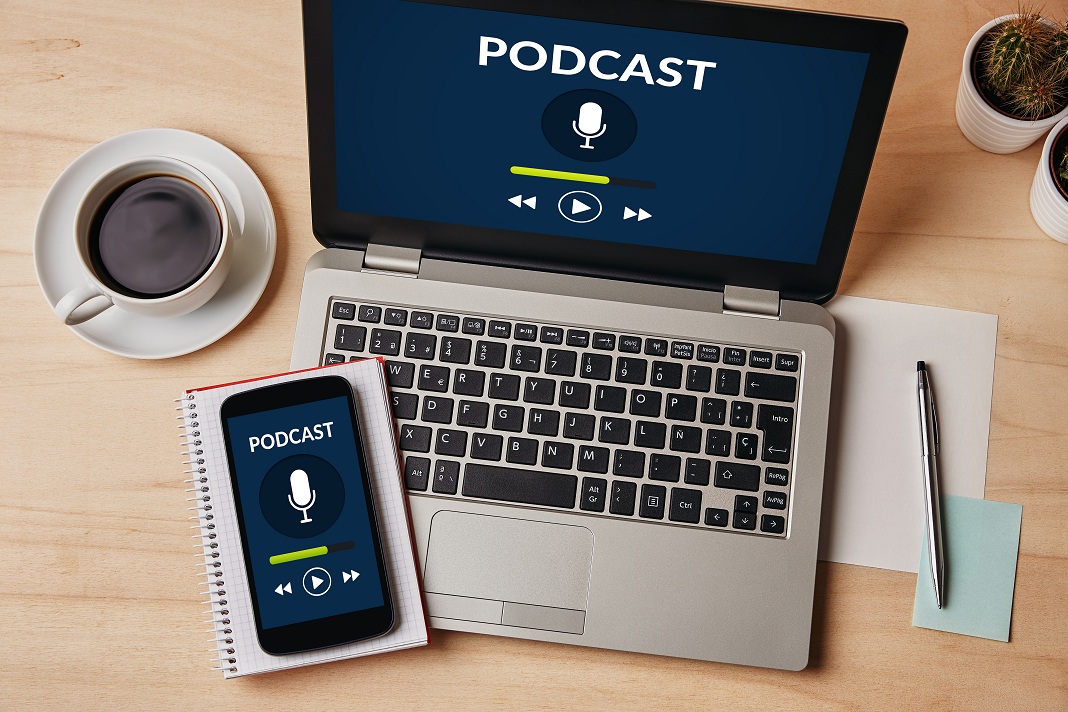
Have you ever wanted to own a Radio show? Have you ever wanted people to hear you talk? Well if yes, this could be the perfect time to start a Podcast. You can make your dreams a reality quite easily and quickly. Podcasts are one of the fastest growing ways to host talk shows, become a radio jockey or become a recording artist. Thanks to the internet and the immense reach we get through it, it has become so simple and cost-effective to own and run a podcast.
Many people are still not completely aware of what podcasts are and how they work. That’s why most of them hesitate to start one. In this article, we shall share with you the ins and outs of Podcast – what they are, how they work, and how to start a podcast. What is important for you to know is that you need not to be a techie or a rich dude to learn and start a Podcast. You just need the attitude to do it.
What is the Podcast? How do they work?
According to research conducted last year, 40% of the Americans have listened to a Podcast in 2017 and 24% listens at least one in a month. The numbers have grown by 4% to 5% in 2018.
So, what is this new rage exactly? In simple terms, podcasts are blogging with digital audio technology. It is about creating an endless supply of content in audio format. Podcasts have content ranging from music, sport, health, to fashion, philosophy and many more niches, just like blogs.
Podcasting is a free service that lets listeners retrieve MP3 audio files from podcasting website and listen on their computers, smartphones, or personal audio players. The term Podcast is derived from the words ‘iPod’ and ‘Broadcasting’.
But they are much better than Radio channels. You don’t have to tune in to a particular station to listen to the broadcast. You have to first load RSS feed (Really Simple Syndication) in your player. You then, have to download the podcast or subscribe to your favorite Podcaster through the feed. The RSS thereafter will automatically download the podcast to your device.
If you don’t wish to download the podcast, you can stream in either a feed reader like Feedly or on the blog or website itself where the podcast is embedded.
You now know what a Podcast is and how it works. But, you may not be sure if you should start it.
Why You Really Should Start a Podcast
- Easily accessible
- Can be listened to on the go
- Emerging market
- You can be an authority
- Develops emotional connection
- They are free to listen
If you understand the value of content for your business or brand and the impact it creates on users, then you will definitely understand the value of podcasts. Podcasting allows you to reach new audiences quickly, especially to the niche that prefers audio formats to long-framed word content. And, with devices like Amazon Alexa and Google Home, podcasts are becoming a popular content platform.
Since podcasts can listen on the go, while cooking, while driving, in the gym, and while walking, it is stealthily entering the niche audience that was hard to crack by bloggers. You don’t need to be an established content creator or follow the SEO guidelines to create your podcasts. In fact, this is an excellent time to establish and grow your podcast audience right from scratch and place yourself as a dominant player in the industry.
Just like blogs, podcasts have the potential to drive back organic traffic to your website or web store. You can also share the podcast links in your social media channels and other places. People today are spending more time on Podcasts (30%) as opposed to AM/FM radios (21%) and listening to own music (23%).
There are a lot of opportunities in various niches as this is still a growing industry. Therefore, podcasts will allow you to position yourself as an expert on your chosen topic, which will help you to build and influence your audience faster.
What’s more? Your audience will be listening to your voice for 20 minutes. This means, you get an opportunity to create an intimate connection or personal relationship with your listeners, which is genuinely not possible with blogs. Your voice, accent, tone, reaction, and pauses will increase the level of engagement among the audience.
Steps to Start Your Podcast
Step 1: Identify Your Purpose
What is your podcast for? Why do you want to make one? The answer will vary based on your interest, job, business etc. You must find out if Podcasting is a great way to market your skills, build authority in your business, provide your customers or target audience useful information, or a source for entertainment.
Many people start podcasting as a hobby. You will have to create a show and select a subject that will dominate the show. The chosen subject should interest you or else, by the end of the second or third episode, you will have nothing to talk about.
You must identify your reason before you even start planning. Your reason will keep you motivated and going.
Step 2: Identify Your Target Audience
This is an equally important step. Your podcasts should focus on a target audience and meet their expectations. If this is going to be a serious business venture, your target audience should be more specified and gathered. For instance, you own a fitness club, who wants to make health and fitness podcast, then your target audience should be people interested in health and related things, such as diet, healthy eating, nutrition, weight loss, exercises, bodybuilding, buying the right fitness products etc.
On the other hand, if you wish to start a podcast out of a hobby, let’s say love for superhero movies or Game of Thrones, then your target audience will be the fans of such fictions, such as Avengers, X-Men etc.
You have to create a listener persona, just like a buyer persona. Name the persona (say, Kit) and write down his attributes, likings, choices, etc. The persona should be in your mind every time you plan a podcast. For example, will Kit like this or choose that?
Step 3: Create an Inspiration, a Reason
Ask these questions when you reach step 3, “Why should people listen to me?” “How am I different?” You have to provide value in each of your podcast episodes – value in the form of information, facts, DIY, answers, history, details, and guidance.
It is important to give them a reason to come back to you and you have to think about how you can in the planning stage itself. You have to add something that others don’t. You should be able to easily write 15 to 20 episodes, full of value before you plan to broadcast your podcast.
Step 4: The Name – Crucial than Anything Else
Now your show name will speak a thousand words about you and about what your podcast. Don’t just select the first name that comes to your mind. Give some time, research, make a list, and then select one. Three ways you can use to come up with your Podcast show name. Before delving deep, remember that your Podcast name will directly influence your audience, so it should reflect the episodes and the content you do.
For starters, you could use your Own Name. However, this is not a ‘recommended’ option. If Selena Gomez decides to use her name for her styling podcast, sure millions of listeners would choose her. But if you, who is not a famous personality, use your name, you may not get many followers. People may not know who David Parkinson is. So, unless you already have a crowd, this is not an option. Again, you can combine your name with something descriptive, something like ‘Style Your Way with Tia’.
You could use a Clever or Unique Name, something like “Wisdom Cracker”. Now, this is clever but it doesn’t tell anything about your subject. If you want people to find you in search, then try incorporating a description into the clever title. For instance, you could use “Wisdom Cracker’s Guide to Leadership and Winning”.
Finally, the most recommended is a Descriptive Name. These names are easily searchable but are quite boring. They say exactly say what the show is all about, such as “The Fitness Guide”, “The Vegan Food Show” etc.
Make sure your name is not too long and it should be easily pronounceable.
Step 5: Decide the Length of Your Episode
Your episode should last between 15 minutes to 30 minutes. Anything less than that will be deemed as unimportant and anything longer will definitely lose listener’s concentration.
However, there are longer episodes that people listen to. These longer episodes stream for more than hour. Your content and your audience will decide the length of your podcast.
It is believed the average time to commute is around 20 minutes. And that is how long a person can concentrate on a particular topic or subject. And so, most Podcasts are of that length. In case of interviews, discussions, and roundtables, a podcast can go as long as two hours.
You have to gauge your audience. In fact, your listeners will tell you over time what they think about your content. A survey will reveal the answers. Give time and things will definitely fall into place.
Step 6: Decide the Interval of Your Podcast Release
Just like the length of the episode, your subject, content, and audience will decide the episode count. You could upload a podcast every day or once in two weeks or twice a week or any way you find satisfying. Uploading shows once a week creates a good impact. Although a monthly and fortnightly show will create a positive impact, in order to be part of people’s lifestyle and schedule, you need to post more often but not too often.
That being said, the point here is not the number of episodes but the consistency and quality. If you post podcasts every Tuesday and Wednesday, overtime listeners will start expecting a podcast on those particular days. Therefore, you really need to maintain consistency in your commitments.
On the other hand, just because you have to meet a deadline and fulfill your commitments, you cannot simply put pointless episodes just for the sake of it. If the quality of the content is not great, people may not listen to you. You will be more appreciated if you post one great episode in a month than four uninspiring episodes. Once you have gained traction, conduct a survey to find your answers from your audience.
You can also choose the television style and podcast in seasons. For instance, you can create 12 episodes, three for each season. Select a theme for each season and work your episodes around it. You could launch the three episodes together or leave a gap after each episode. Repeat the process.
Step 7: Format of Your Podcast
Different types of options are available here. You can go solo, co-host shows with another podcaster, take interviews, do roundtables, documentary or create docu-drama.
The first three are the most popular ones that most Podcast hosts prefer. You can also try a combination from the above formats. For instance, if your podcast is about Fashion and Styling, you could do an interview session with an ace Fashion Photographer for tips in one episode and co-host with a Fashion Designer in another.
Step 8: Recording Your Podcast
Steps 1 to 7 were the groundwork that is must before actually starting to record your Podcast. Once you have planned your show, your next process steps would include buying equipment, mic, and recording and editing tools, working with the scripts, learning to talk into the mic, and finally producing and publishing your podcast.
You will find the information related to Equipment, Recording, and Publishing Podcast on our popular blog, “Easy Way to Start a Podcast”.
Hope, we were truly able to guide you through the process. Do take a look at both the articles for complete knowledge. If you have any doubts, post in the comments below. We shall get back to you at the earliest. Until next time.




